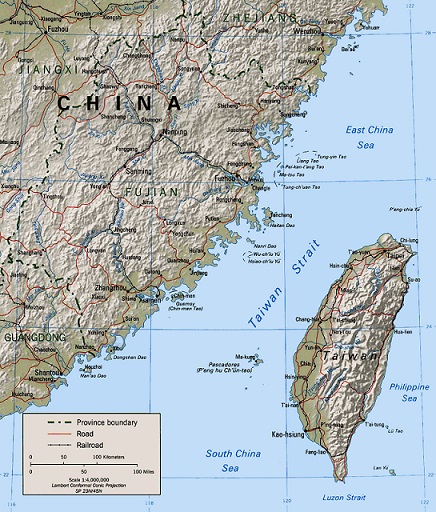It’s not only in the disputed waters of South China Sea that China is flexing its muscle. It is also making troubling moves in Taiwan Strait.
But the big difference is, while the Philippine leadership acquiesces with nary a whimper as China continues fortification of the seven reefs it had transformed into artificial islands in the disputed waters of Spratlys, Taiwan is protesting what it says is China’s violation of a 2015 agreement not to use the flight route that divides them.

Taiwan Strait. From Wikipedia.
A statement from the Taipei Economic and Cultural Office in the Philippines states: “On Jan. 4, Taiwan government protested mainland China’s unilateral launch the northbound M503 flight route in the Taiwan Strait and the W121, W122, and W123 east-west extension routes.
“Mainland China initiated these four routes without prior communication with Taiwan and began flights on them the same day. Taiwan believes this action violates the negotiation results reached between the Taipei Airlines Association and China Air Transport Association in March 2015, when mainland China repeatedly pledged to use the M503 route only for one-way southbound flights, and not to activate the W flight routes until after confirmation through further negotiations.
“The unilateral launch of these routes also runs entirely counter to international civil aviation regulations, disregards aviation safety, and disrespects Taiwan. The ROC government calls on all parties not to use these flight routes as serious safety concerns remain. “
A TECO official said the reason why they insist that the M503 route, which is in the middle between mainland China and Taiwan, be clear is for their security.“From the middle line, which is considered a battle zone, it would take only six to seven minutes for a jet fighter to reach Taiwan.”
Although the Beijing-based People’s Republic of China and the Taipei-based Republic of Taiwan has a vibrant people-to-people and economic relations, the strain remains. The Chinese civil war which began in 1927 between the Chiang Kai shek-led Nationalist Party of China and the Mao Tse Tung-led Communist Party of China ended in 1949 with the latter taking over the mainland and pushing Chiang to Taiwan.
Taiwan is considered one of the two (the other is Tibet) core sovereignty issues of China, which considers Taiwan its province.

Taiwan President Tsai Ing-wen.
The United States, which supports an independent Taiwan, as a check on China’s power in Asia Pacific has expressed serious concern on Beijing’s unilateral launch of the Taiwan Straits routes, which is seen as a pressure to Taiwan President Tsai Ing-wen.
Last week following a National Security Council meeting, Tsai called on Chinato “fulfill its responsibilities to the region and resume negotiations with Taiwan promptly.”
She said, “The activation of these contentious routes has not only severely influenced regional security and flight safety, but constitutes a political and military threat to Taiwan, and as such destabilizes the region. As a member of the regional community, mainland China has a duty to preserve regional stability, and such actions are irresponsible.”
She said the 23 million strong nationwill continue to strengthen its national security and defend itscore values of freedom and democracy.